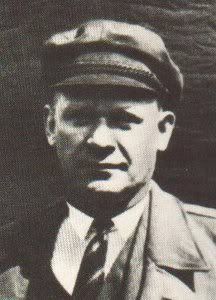Ernst Thälmann
From Kaiserreich
|
Ernst Thälmann (born on April, 16 1886 in Hamburg, Germany) is a German politician. Deputy in the Reichstag, he is today the main advocate of Marxist-Leninist and revolutionnary theories within the Sozialdemokratische Partei Deutschlands.
Biography
Born in Hamburg, Thälmann was a Social Democratic Party member from 1903. Between 1904 and 1913 he worked as a stoker on a freighter. He was discharged early from his military service as he was already seen as a political agitator. One day before his call up for military service in the Weltkrieg in January 1915, he married Rosa Koch. Towards the end of 1917 he became a member of the short-lived USPD (Independent Socialist Party of Germany). When the USPD split over the question of whether to join the short-lived Communist Internationale, Thälmann sided with the pro-Communist group and animated various demonstrations throughout Germany to stop the interference in the Russian Civil War and ask the abolition of the monarchy, arguing that the Weltkrieg had deeply weakened the comfort standards of the German population. As a result, he was quickly arrested and sentenced to seven years of jail for having called to the Revolution.
Then Thälmann was released in 1926, Soviet Russia had been totally defeated, Syndicalism had overshadowed Marxism-Leninism and the revolutionnary USPD had reunited with the SPD after the work of Friedrich Ebert. Thälmann appeared as a broken man, without any political future, condemned to be subordinate within the Social Democratic Party. However, even if he reintegrated the SPD, Thälmann continued to profess a harder line within the SPD who was losing the workers' support to National-Populists or more pro-Syndicalist politicians. Inspired by the methods of the Jacobins in the Commune of France, he quickly arose in German politics and was elected as representative for Hamburg in the 1931 general elections.
Nowadays, the Marxist-Leninist wing of the SPD, named by some newspapersmen the "KPD" (Communist Party of Germany), came to a national prominence, led by the iron fist of Thälmann, and even attracting intellectuals such as Bertolt Brecht or Ernst Toller. Many poltical observers are eagerly waiting for the next Congress of the SPD who will decide of the future inclinations of the leftist German party. But of course, Thälmann's destiny will slightly follow the fate of World Revolution...

